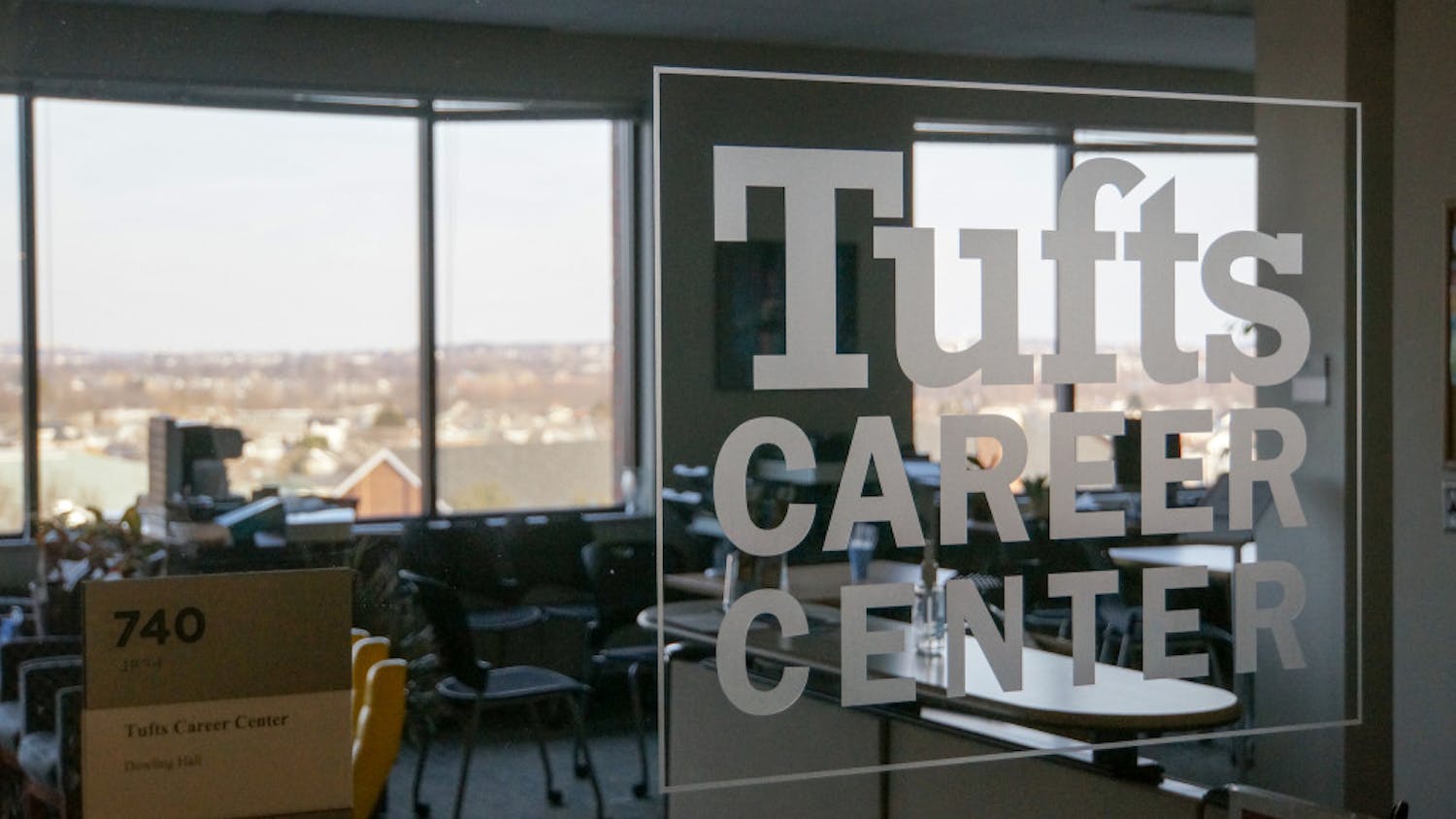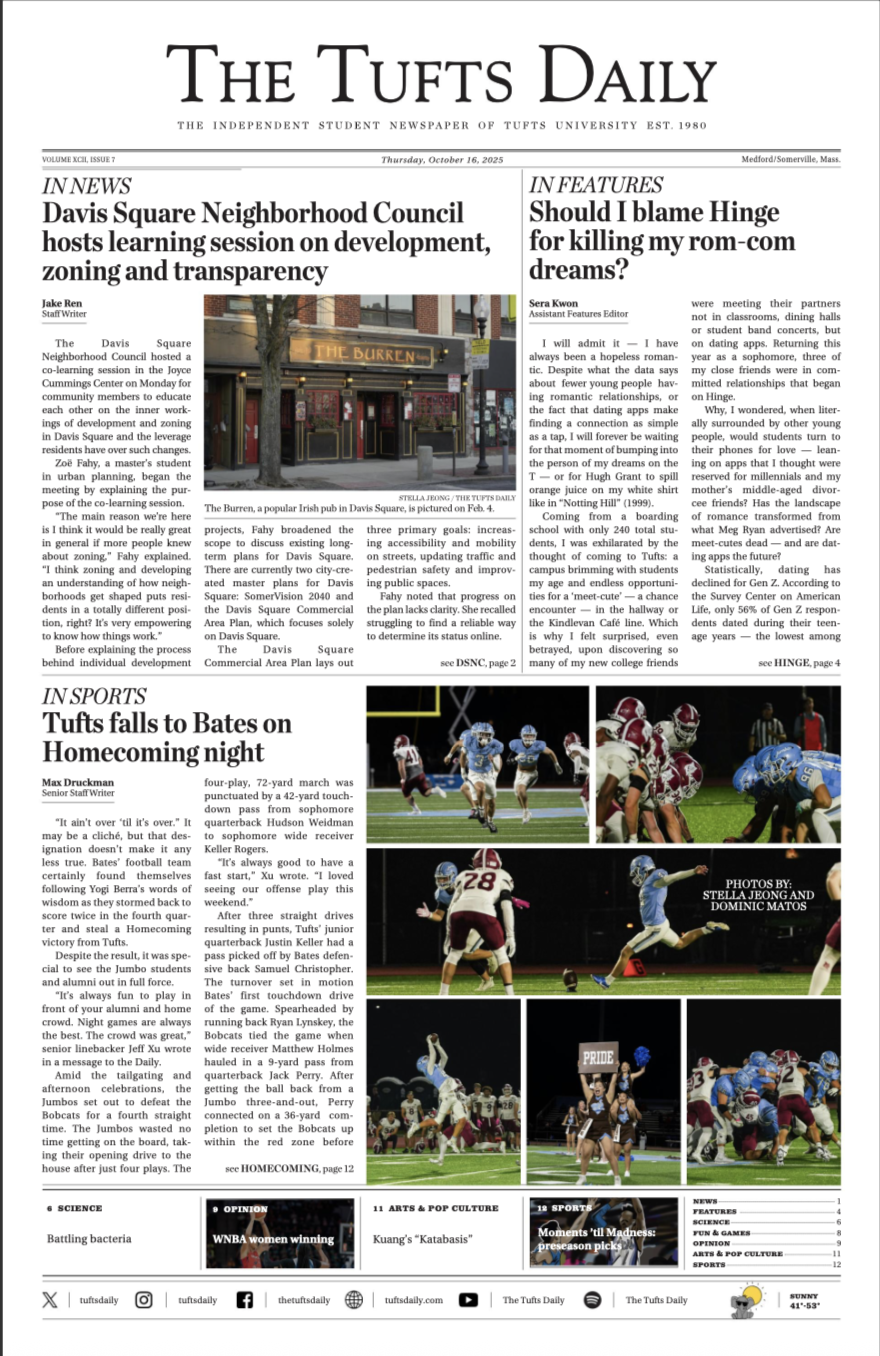Senior Lumay Wang sat across from Murat Salim Esenli, the Turkish ambassador to China, on August 11, 2010, as she explained the message behind the display that Turkey had chosen to exhibit at the 2010 Shanghai World Expo. She was at the Expo researching how nations brand themselves to the Chinese public through visual representation, and her research led her to an interview with the ambassador himself, as well as the Turkish Consulate General and the pavilion director in charge of the entire Turkish exhibit. Wang's thesis, not unlike many chosen by Tufts students from the class of 2011, is not your run-of-the-mill research project.
Tufts seniors have the option of writing a year-long senior thesis in order to fulfill class requirements for graduation. Unlike other classes at Tufts, theses are often independent studies in which the student identifies a topic of interest, forms a plan of action with his or her adviser and individually carries out the research and explication of the chosen subject. This year, many of the theses subjects have exemplified the diversity of interests on campus as well as the ingenuity of those undertaking the projects. This is a small sampling of a few such theses.
Lumay Wang
"Generally, I am interested in the politics of visual culture — how things are represented, how we view the world, nations especially," Wang said of her thesis topic for both her art history and international relations majors. "I am specifically looking at the representation of nations, how they represent themselves. It's called nation branding."
With the help of the Tufts Summer Scholars Program, Wang traveled to Shanghai in August for the 2010 Shanghai World Expo, a world fair in which nations put forth exhibits about their countries for the general public to view. She looked specifically at the visual images shown by each country for the general consumption of the Chinese populace.
"When you think about national identity, it's a very complex idea, but at the Expo it's very simplified," Wang said. "It has to be, because they are creating a nation brand to attract more Chinese consumers. Because of China's growing economy, and the rest of the world's financial crisis, these countries are trying to attract business at the Expo."
From her specific experience at the Shanghai World Expo, Wang gained knowledge not only of the specific countries she researched, but also of visual culture as a whole.
"Anyone can manipulate visual culture," Wang said. "The Expo is just one example. It's significant because, for instance, most of the visitors to the Expo were Chinese. For the most part they have little knowledge of the countries [there], so what they see presented by different countries influences their perception of the world."
Wang is currently making final adjustments to her thesis and preparing for her thesis defense in front of members of the Department of Art History and International Relations Program. She will also be speaking tomorrow at the Tufts Idea Exchange about the larger ideas of her thesis.
Christopher Vorlicek, Ryan Nelson and Justin Watanasiri
Seniors Chris Vorlicek, Ryan Nelson and Justin Watanasiri wanted to do something different for their senior design project in mechanical engineering, which is similar to the senior thesis at the College of Arts and Sciences. Instead of developing a research topic, however, students in the semester-long design class must design, create and present an original machine. Projects have ranged from the concept for an electronic book for the blind to an adjustable high heel to this trio's project: an electric car.
"I was just thinking about design projects over the summer … and electric vehicles was something I looked into," Vorlicek said. "I just needed to find a team as willing as I was."
The project involved converting a gas-operated Volkswagen Beetle into an electric car.
"We took out the engine and designed and built an electric motor," Nelson said. "Most of the project of the design was trying to interface the electric motor with the transmission of the car."
While creating the design and working on the project, Vorlicek, Nelson and Watanasiri faced unforeseen setbacks. Since they didn't have any previous experience with cars, the scope of the project was at times overwhelming, Vorlicek said. But ultimately, the satisfaction of creating the vehicle and watching it work was worth the initial frustration and allowed the trio to explore their interests in engineering in a way that classroom lecture study could not.
"I know now from this project that my ideal job would be at a smaller company where I would be able to deal with all aspects that go into designing and building in engineering," Watanasiri said.
Elinor Cannon
Studying abroad in Alexandria, Egypt, and Seville, Spain, during her junior year, senior Elinor Cannon witnessed the distinct perspectives of two very different cultures firsthand and, perhaps more importantly, the mixing of these cultures through immigration from North Africa to the southern coast of Spain.
Coming back to Tufts in September with an interest in the two regions and a firm grasp of both Arabic and Spanish, Cannon decided to combine her interests into a thesis. This thesis involved translating the book "Diario de un ilegal," or "Diary of an Illegal Immigrant," into English. The 200-page memoir was written by Rachid Nini, a Moroccan immigrant who lived for two years illegally in Spain. The book was originally written in Arabic in 2001 and later translated into Spanish.
"[It] is one of the only books that I found that has an interesting interaction between the two cultures," Cannon said. "The author gives commentary on the way Spain and the Arab world view each other and how they interact in social settings."
Translating the book also gave Cannon a perspective on illegal immigration from the immigrant's point of view. The utopian ideas that immigrants have in their minds are often not the reality, Cannon said.
Cannon hopes that her translation, along with the preface she is writing for the book, will help English-speaking students to better understand the two cultures as well as illegal immigration.
"I want students to gain a broader perspective of immigrations in terms of being ‘the Other.'" Cannon said. "The book challenges stereotypes of immigrants and how the media has distorted their image."
Cannon hopes that even after her thesis is complete, her project will continue.
"Personally, I'm really grateful that it's a project that I can continue doing after the thesis is done," Cannon said. "Translation is a continuing process, something that you get better at with time and practice."





